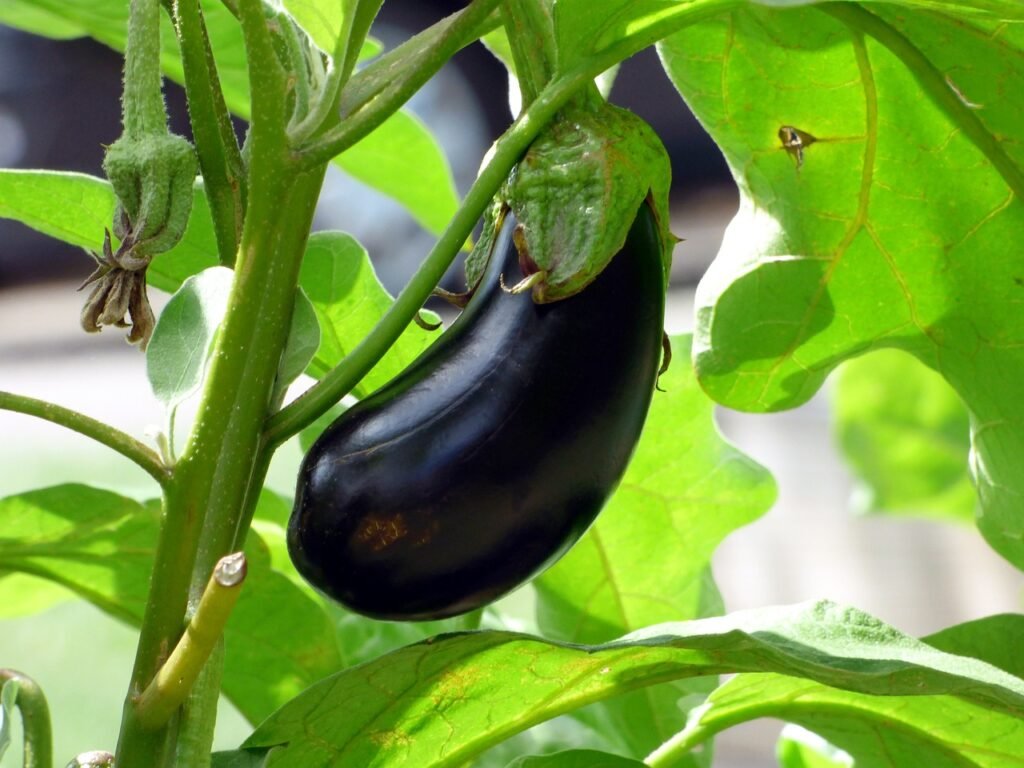Eggplant Growing Guide From Seed To Harvest To Health Benefits

Are you looking to add a versatile and nutritious vegetable to your garden? Explore the comprehensive eggplant growing guide, which covers choosing the right variety, planting from seeds or seedlings, harvesting, and storing your eggplant.
Discover the health benefits of this delicious vegetable and try out some mouthwatering eggplant recipes.
Become an eggplant expert today!
What is the Eggplant?
Eggplant, also known as aubergine, is a purple vegetable that belongs to the nightshade family, Solanaceae.
This unique vegetable is distinguished by its deep purple outer skin and creamy flesh, which lends itself well to a variety of culinary applications. From hearty stews to crispy fried dishes, eggplant’s versatility in the kitchen knows no bounds. Being a member of the Solanaceae family, it is related to other popular vegetables like tomatoes and peppers, sharing similar growing conditions and botanical characteristics.

How to Grow Eggplant?
Growing eggplant successfully involves proper care in planting, providing suitable soil conditions, adequate watering, optimal sunlight exposure, and adequate fertilization.
- To start, when planting eggplant, choose a sunny spot in your garden with well-drained soil. Ensure the soil is rich in organic matter and has a slightly acidic pH level.
- Plant the eggplant seedlings at a depth where only the top leaves are above the soil. Water the plants deeply but infrequently to encourage strong root development.
Eggplants thrive in full sunlight, so make sure they receive at least 6-8 hours of sunlight daily. Fertilize the plants regularly with a balanced fertilizer to promote healthy growth and fruit production.
Choosing the Right Variety
Selecting the appropriate eggplant variety is crucial for a successful harvest, considering factors such as sowing methods, germination requirements, transplanting guidelines, and companion planting options.
Choosing the right eggplant variety is crucial for a successful garden. Eggplants come in a range of sizes, shapes, and colors, from the classic deep purple to striking white and even vibrant striped varieties. The ‘Black Beauty’ is a popular choice for its large, plump fruits and traditional flavor, while ‘Ichiban’ offers long, slender vegetables perfect for stir-fries.
For something a bit different, ‘Rosa Bianca’ presents a stunning, rounded fruit with a delicate, mild taste. Consider your climate, as some varieties thrive in warmer temperatures, and your culinary preferences when selecting. Each variety brings its own unique flavor and aesthetic to your garden and table, making eggplant a versatile and rewarding crop to grow.
Different eggplant varieties exhibit varying growth habits, with some being more suitable for container gardeningwhile others thrive in open fields.
Understanding your region’s climate is essential to choose a variety that can withstand the local conditions. When sowing eggplant seeds, ensure they are planted in well-draining soil and receive adequate sunlight. Germination typically takes around 7-14 days, after which seedlings can be transplanted.
Consider companion plants like basil and marigold to deter pests and enhance growth in your eggplant garden.
Starting from Seeds or Seedlings
When initiating eggplant cultivation, growers can opt to start from seeds or seedlings, each method offering distinct advantages in terms of seed germination, transplanting success, and organic gardening practices.
Planting eggplant from seeds provides the advantage of selecting specific cultivars that may not be readily available as seedlings. It also allows for a deeper understanding of the plant’s growth process from the very beginning.
On the other hand, starting with seedlings provides a head start in terms of growth, reducing the time to transplanting. For successful germination from seeds, ensuring consistent moisture and warmth is crucial, while when handling seedlings, gently transplanting them into well-prepared soil can promote healthy root development.

Planting and Caring for Eggplant
Planting and caring for eggplant involves meticulous attention to planting depth, watering consistency, sunlight exposure, ongoing plant care, and the rewarding experience of harvesting homegrown produce.
- When planting eggplants, it is crucial to ensure they are placed in well-drained soil at a depth of around 1/4 inch.
- Adequate watering is essential, aiming for moist soil without over-watering.
- Eggplants thrive in sunlight, requiring at least 6-8 hours of direct sunlight daily.
- Regularly check for pests and diseases, providing proper care to maintain plant health.
The joy of watching your eggplant seedlings grow into mature plants and eventually enjoying the fruits of your labor by harvesting fresh, flavorful eggplants from your own garden is truly gratifying.
What are the Health Benefits of Eggplant?
Eggplant offers a multitude of health benefits, being rich in essential nutrients, antioxidants, vitamins, minerals, and dietary fiber that contribute to overall well-being.
These nutrients and antioxidants play a crucial role in supporting various bodily functions and promoting optimal health. For instance, eggplant is particularly known for its high levels of vitamins C, K, and B6, as well as minerals like potassium and magnesium. These components help improve immune function, aid in blood clotting, maintain healthy blood pressure, support nerve function, and contribute to strong bones. The dietary fiber content in eggplant promotes digestive health by enhancing gut motility and keeping you feeling full and satisfied, making it a valuable addition to a balanced diet.

Rich in Nutrients and Antioxidants
The abundance of nutrients and antioxidants in eggplant supports heart health, providing essential vitamins, minerals, and antioxidant compounds that promote cardiovascular well-being.
Eggplant is a rich source of fiber, which aids in digestion and helps to maintain healthy cholesterol levels. It is also low in calories, making it a great choice for those looking to manage their weight. The presence of potassium in eggplant can help regulate blood pressure, further benefiting heart health. The presence of phytonutrients like nasunin in eggplant offers protective effects against oxidative stress, reducing the risk of chronic diseases and promoting overall well-being.
May Help Lower Cholesterol Levels
Consuming eggplant may aid in lowering cholesterol levels and reducing inflammation, contributing to improved heart health and lower risks of cardiovascular complications.
This versatile vegetable is rich in antioxidants, particularly nasunin, which helps protect the heart by reducing oxidative stress and inflammation. Eggplant is a good source of fiber and phytonutrients, essential for maintaining healthy cholesterol levels.
By incorporating eggplant into your diet, you can not only enhance the taste of your meals but also support your overall cardiovascular well-being. The fiber in eggplant can help with cholesterol management by binding to bile acids in the digestive system, promoting their excretion, and ultimately lowering LDL cholesterol levels.
May Aid in Weight Loss
Incorporating eggplant into a balanced diet may aid in weight loss efforts due to its low-calorie nature, high fiber content, and satiating properties that promote a feeling of fullness.
With only around 20 calories per 100g serving, eggplant is not only low in calories but also a good source of dietary fiber, which can help in managing weight by keeping you fuller for longer periods and reducing overall calorie intake.
The fiber in eggplant aids in digestion and contributes to a healthy gut, supporting a balanced metabolism. The satisfying texture and taste of eggplant make it a versatile and delicious ingredient that can easily be incorporated into various dishes, offering a nutritious and delicious way to support weight management goals.
May Improve Heart Health
The antioxidants present in eggplant may contribute to improved heart health and reduced cancer risk, making it a valuable addition to a heart-healthy and anti-cancer diet.
These antioxidants help in reducing oxidative stress, which is crucial for maintaining the health of the cardiovascular system. By supporting cardiovascular function, eggplant can aid in lowering the risk of heart diseases. The potential cancer-fighting properties of eggplant are attributed to its ability to combat free radicals and inflammation, which are linked to the development of cancer. Including eggplant in your meals regularly can be a beneficial strategy for safeguarding your heart health and potentially reducing the risk of cancer.

How to Harvest and Store Eggplant?
Knowing the ideal time to harvest eggplant and implementing proper storage practices are essential steps to preserve its freshness and flavor for various culinary uses.
When harvesting eggplants, it is recommended to wait until the fruits have reached a mature size and are still glossy in appearance. To check for ripeness, gently press the eggplant with your finger – if it leaves an indentation but bounces back, it’s ready to be picked. After harvesting, ensure to store the eggplants in a cool and dry place to maintain their freshness. Eggplants can be stored in the refrigerator for up to a week. The versatility of fresh eggplant allows for a myriad of delicious dishes, from classic eggplant parmesan to grilled eggplant sandwiches.
Knowing When to Harvest
Understanding the signs indicating the right time to harvest eggplant is crucial for ensuring peak flavor, quality, and nutritional content in the harvested produce.
One of the key visual cues to consider when determining the optimal harvesting time for eggplants is their glossy appearance. Ripe eggplants often have a shiny, smooth skin that indicates maturity.
Gently pressing the eggplant with your thumb can help assess its readiness. A ripe eggplant should feel firm but slightly give under pressure, signaling that it’s ready to be picked. It’s also important to take into account the size and color of the eggplant as indicators of maturity.
Once harvested, using fresh eggplant in culinary preparations enhances the taste and nutritional value of dishes.
Properly Storing Eggplant
Implementing proper storage methods post-harvest helps maintain eggplant’s freshness, ensuring its suitability for various cooking applications and recipes.
By controlling the temperature, humidity, and storage conditions, you can significantly prolong the shelf life of harvested eggplant. Keeping eggplant at temperatures between 45-50°F (7-10°C) prevents it from deteriorating quickly. Storing eggplant in a well-ventilated area with moderate humidity levels around 85-90% ensures that it retains its crisp texture and flavor. The environment in which eggplant is stored plays a crucial role in preserving its taste profile, ensuring that it maintains the desired firmness and flavor when incorporated into dishes.

What are Some Delicious Eggplant Recipes?
Explore a world of culinary creativity with delicious eggplant recipes that showcase its versatility in Mediterranean cuisine and various culinary uses.
From smoky grilled eggplant slices drizzled with olive oil and sprinkled with fresh herbs to creamy baba ganoush dip made from roasted eggplant, tahini, and garlic, there are countless ways to enjoy this vibrant vegetable.
Try transforming eggplant into a hearty ratatouille with tomatoes, zucchini, and bell peppers, or savor the flavors of stuffed eggplant rolls filled with a savory mixture of breadcrumbs, herbs, and feta cheese.
Eggplant also shines in dishes like moussaka, a Greek casserole layered with eggplant, spiced meat, and creamy bechamel sauce, showcasing the depth and richness of Mediterranean flavors.
Eggplant Parmesan
Indulge in the classic comfort of eggplant parmesan, a beloved vegetarian and vegan-friendly dish that layers crispy eggplant slices with savory tomato sauce and gooey cheese.
Begin by slicing the eggplant, then generously sprinkle each side with salt to draw out excess moisture and bitterness. After letting the eggplant sit for about half an hour, rinse and pat dry. Dip the slices into a mixture of breadcrumbs and Parmesan cheese for a crispy coating before frying or baking until golden brown. Assemble the layers by spreading a rich tomato sauce at the bottom of a baking dish, placing the fried eggplant slices on top, and adding a sprinkle of vegan cheese for that perfect gooey finish. Bake until bubbling and golden, then garnish with fresh herbs for a satisfying culinary experience.
Grilled Eggplant with Balsamic Glaze
Savor the smoky flavors of grilled eggplant drizzled with tangy balsamic glaze, a delectable vegetarian dish that combines charred eggplant with sweet-sour balsamic reduction.
The key to achieving perfect grilled eggplant lies in slicing it into even rounds or lengthwise strips, then brushing them lightly with olive oil, salt, and pepper. With the grill preheated to medium-high, place the eggplant slices directly on the grates, rotating them occasionally for those beautiful grill marks.
As the eggplant cooks, prepare the balsamic glaze by simmering balsamic vinegar and a touch of sugar until it thickens into a glossy, sticky sauce. Once the eggplant is tender and charred, drizzle it generously with the balsamic glaze, creating a harmonious blend of savory, smoky, tangy, and sweet flavors.
Baba Ghanoush
Delight in the creamy goodness of baba ghanoush, a luscious Middle Eastern dip made from roasted eggplant, tahini, garlic, and aromatic spices that’s a must-try for vegans and flavor enthusiasts.
This classic dish is renowned for its smoky flavor profile, achieved by charring the eggplant until the skin is blackened and the insides are soft and flavorful.
The blend of tahini and garlic adds richness and depth while the spices like cumin and paprika bring a delightful warmth to each bite.
Baba ghanoush not only tantalizes the taste buds but also offers a healthy alternative to creamy dips, as it is packed with nutrients and antioxidants from the eggplant and tahini.
It’s the perfect accompaniment to pita bread, raw veggies, or as a flavorful spread in sandwiches.
Eggplant Caponata
Indulge in the vibrant flavors of eggplant caponata, a traditional Italian dish that combines diced eggplant, tomatoes, olives, capers, and aromatic herbs in a savory-sweet symphony of tastes.
This exquisite dish, originating from Sicily, is celebrated for its rich medley of flavors that perfectly balance sweet, tangy, and umami notes. The tender eggplant, stewed to perfection, forms the heart of this recipe, absorbing all the wonderful flavors from the tomatoes, olives, and capers. The addition of balsamic vinegar lends a subtle acidity, while fresh basil and parsley elevate the dish with their aromatic essence.
Eggplant caponata is not just a dish; it’s a flavorful journey that delights both vegetarians and omnivores alike with its authentic Italian charm.
Eggplant Growing Guide Wrap Up
Embarking on the journey of growing eggplants can transform your garden into a vibrant canvas of colors and shapes, while rewarding you with delicious, homegrown produce. With each variety offering its unique charm and flavor, there’s an eggplant for every palate and garden size.
We invite you to delve deeper into the art of vegetable gardening by visiting our blog, where a world of knowledge awaits. Subscribe to our newsletter for curated tips, seasonal gardening advice, and inspiration straight to your inbox. Explore our extensive collection of vegetable growing guides to enhance your green thumb. Join our community today and cultivate a garden that’s as nourishing as it is beautiful.
Frequently Asked Questions
To grow eggplant from seed, start by planting them indoors 8-10 weeks before the last frost. Use a good quality potting mix and plant the seeds ¼ inch deep. Keep the soil moist and place the container in a warm and sunny spot. Transplant the seedlings outdoors after the last frost.
Eggplants can be harvested when they are firm and glossy, typically 60-80 days after planting. You can also check by gently pressing on the skin – if it springs back, it is ready to be harvested. If the skin remains indented, give it more time to mature.
Eggplants contain high levels of antioxidants and nutrients, making them a healthy addition to your diet. They are a good source of fiber, potassium, and vitamins B1 and B6. They also contain phytonutrients that have been linked to reducing the risk of heart disease and improving brain function.
Eggplants need consistent moisture, so it is important to water them regularly. Depending on the weather and soil conditions, this could mean watering them every 2-3 days. It is best to water deeply, allowing the water to reach the roots.
Yes, eggplants can be grown in containers as long as they have enough space for their roots to grow. Use a large container, at least 12 inches in diameter, and fill it with a good quality potting mix. Make sure the container has drainage holes and place it in a sunny spot.
Eggplants can be cooked in a variety of ways, such as grilling, roasting, or sautéing. One popular method is to slice them into rounds, coat them in breadcrumbs, and bake them in the oven. This results in a crispy and delicious dish that can be served as a side or as a main course.



